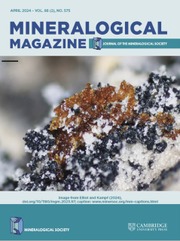Crossref Citations
This article has been cited by the following publications. This list is generated based on data provided by
Crossref.
Hansson, Anette N.
Linderoth, Søren
Mogensen, Mogens
and
Somers, Marcel A.J.
2005.
X-ray diffraction investigation of phase stability in the Co–Cr–O and the Fe–Co–Cr–O systems in air at 1323K.
Journal of Alloys and Compounds,
Vol. 402,
Issue. 1-2,
p.
194.
Headspith, D.A.
Orera, A.
Slater, P.R.
Young, N.A.
and
Francesconi, M.G.
2010.
Investigation of the stability of Co-doped apatite ionic conductors in NH3.
Journal of Solid State Chemistry,
Vol. 183,
Issue. 12,
p.
2746.
Yazdanbakhsh, Mohammad
Khosravi, Iman
Mashhoori, Mahboobeh-Sadat
Rahimizadeh, Mohammad
Shiri, Ali
and
Bakavoli, Mehdi
2012.
Synthesis, characterization and application of nano-sized Co2CrO4 spinel catalyst for selective oxidation of sulfides to sulfoxides.
Materials Research Bulletin,
Vol. 47,
Issue. 2,
p.
413.
Abidat, I.
Morais, C.
Comminges, C.
Canaff, C.
Rousseau, J.
Guignard, N.
Napporn, T. W.
Habrioux, A.
and
Kokoh, K. B.
2017.
Three dimensionally ordered mesoporous hydroxylated NixCo3−xO4 spinels for the oxygen evolution reaction: on the hydroxyl-induced surface restructuring effect.
Journal of Materials Chemistry A,
Vol. 5,
Issue. 15,
p.
7173.
Kim, Byung Kyu
Kim, Dong-Ik
and
Yi, Kyung-Woo
2018.
Suppression of Cr evaporation by Co electroplating and underlying Cr retention mechanisms for the 22 wt.% Cr containing ferritic stainless steel.
Corrosion Science,
Vol. 130,
Issue. ,
p.
45.
Yang, Lu
Bukhovko, Maxim P.
Malek, Andrzej
Li, Liwei
Jones, Christopher W.
Agrawal, Pradeep K.
and
Davis, Robert J.
2021.
Influence of Co on Ethylene Steam Reforming Over Co–Cr–O Spinel Catalysts.
Catalysis Letters,
Vol. 151,
Issue. 5,
p.
1456.
Li, Yu
Jiang, Hui
Cui, Zhenduo
Zhu, Shengli
Li, Zhaoyang
Wu, Shuilin
Ma, Lili
Han, Xiaopeng
and
Liang, Yanqin
2021.
Spin State Tuning of the Octahedral Sites in Ni–Co-Based Spinel toward Highly Efficient Urea Oxidation Reaction.
The Journal of Physical Chemistry C,
Vol. 125,
Issue. 17,
p.
9190.
Neffah, A.
Tabet-Derraz, H.
Benali, M. A.
Boureguig, K. M. E.
Belmehdi, M. Z.
and
Saci, H.
2024.
Investigation of the structural, morphological, optical, and electrical properties of thin films: application of effective medium theories to CdO/Co3O4 composites.
Journal of Materials Science: Materials in Electronics,
Vol. 35,
Issue. 25,
Zhang, Jie
Wu, Zheren
Zhao, Chuang
Yang, Shudi
Ren, Wei
Dai, Weili
Yang, Lixia
Zou, Jian-Ping
and
Luo, Xubiao
2025.
Unveiling the critical role of surface adsorbed oxygen species for efficiently photothermocatalytic oxidation of VOCs: Replenishing the active surface lattice oxygen sites.
Journal of Hazardous Materials,
Vol. 485,
Issue. ,
p.
136905.


